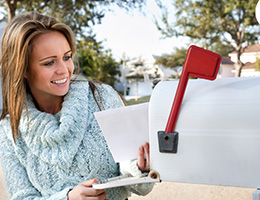
April 17, 2019—Colon cancer is the second deadliest cancer in the U.S. But it doesn't have to be so lethal. Screening can help find colon cancer early—or even before it develops—and save lives.
But only 6 out of 10 U.S. adults 50 to 75 years old—the recommended age range for routine testing by the U.S. Preventive Services Task Force—were screened in 2015. Now a new study suggests a way to encourage adults to stay up-to-date on this crucial cancer screening: mail them at-home testing kits.
The study involved nearly 900 adults who were overdue for colon cancer screening. This meant they hadn't had a colonoscopy in 10 years, a flexible sigmoidoscopy in five years or a stool test within the last year.
All of them received a fecal immunochemical test (FIT) kit from their primary care provider. This test detects hidden blood in the stool that may be a sign of colon cancer or a precancerous polyp.
All of the adults were encouraged to take the test at home and send it back within two months. Some were offered financial rewards with an expected value of $10 to follow through. Some were given the $10 reward up front. Others were told they had a 1 in 10 chance of winning $100 if they returned their kit. But the control group wasn't promised any perks for complying.
Roughly 24 percent of the adults mailed back completed kits within the two-month deadline. And 29 percent did so within six months.
That's an encouragingly high response rate for screening for patients who weren't up-to-date even though they had a primary care provider, the researchers said.
Why so effective?
Financial incentives didn't significantly affect the response rate, the study found. What mattered more was making screening a default option—and an easier process—the researchers said.
Read more about this study in JAMA Network Open.
More research looking at ways to boost colon cancer screening is underway, including offering a choice of a colonoscopy or stool testing. Currently, most efforts at boosting screening rates only focus on one or the other.